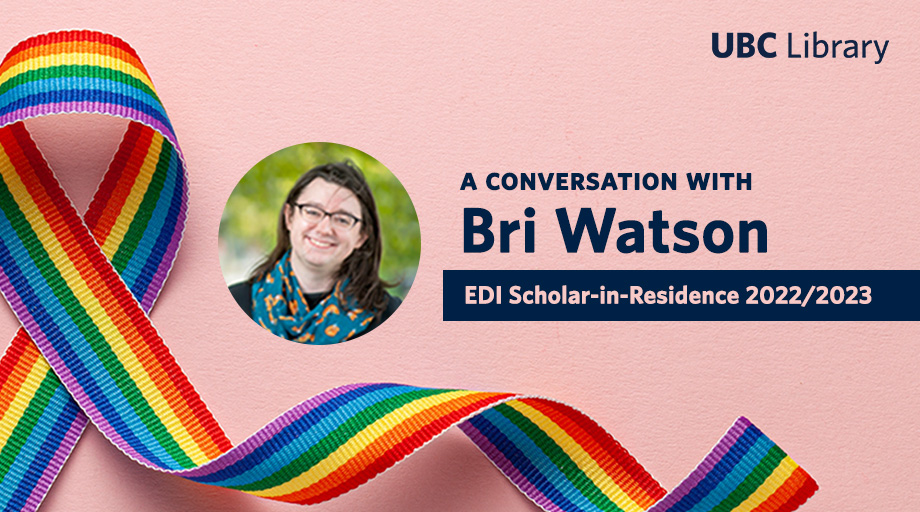
BRI WATSON,
UBC Library EDI Scholar-in-Residence 2022/2023
Bri Watson (they/them), who publishes under the name B.M. Watson, is a Ph.D. student at the University of British Columbia’s iSchool, the Archivist-Historian for the Haslam Collection on Polyamory part of the American Psychological Association’s Division 44 Committee on Consensual Nonmonogamy. They also run the history of sexuality project HistSex.org and contribute to the Homosaurus, an international linked data vocabulary for queer terminology. Read Bri’s full bio.
Q: What have been your biggest professional challenges?
I’ve had a lot of professional challenges just being a disabled, queer and neurodivergent person—in life, in general, in school. In some ways, the personal challenge becomes a professional challenge.
A lot of the time, when you are a student, you don’t have anybody to look up to, or a teacher that is familiar with your struggles. In my case, I was the only disabled person in my school, so that was also a very hard thing. Those things become professional challenges because they become part of the infrastructure around you when nobody else is in a position of power and authority who can tell you what it’s like to be a disabled person, and you’re the first one, in your life, to experience it. Thankfully, over the course of the past five or six years, disability studies have become much more common, and there’s been a lot more [scholarship] built out around that, and that’s wonderful to see.
Q: What has been the highlight of the last couple years for you professionally?
Winning the Vanier Canada Graduate Scholarship was a big a validation for me because I haven’t seen the sorts of things that I’m doing [with equitable cataloging] get that sort of recognition. Sometimes it’s hard to explain what exactly libraries do. You want go to a big professional committee, and say, “Let’s talk about subject headings!” But you can’t, because they don’t know, so you have to walk them through it, starting with [cataloguing basics] like names. So this award is part of that validation.
“It’s very exciting to be in this place where libraries, museums and cultural institutions are finally starting to engage in a way that hasn’t happened before.”
The Trans Metadata Collective just released a report. It’s a group of catalogers and archivists, from libraries, archives, museums, who all came together and created a set of recommendations on how to catalog. And not just catalogs, but information systems. If you’re doing a psychological survey on a trans community [for example], here’s how you should label your data and talk about people.
That was one of the very first times that I’ve led a big organizational effort, and it was really wonderful to see it work and have people come together and produce this report in that way. Now we’ve moved on and created the Queer Metadata Collective, and that is almost a thousand people. It’s very exciting to be in this place where libraries, museums and cultural institutions are finally starting to engage in a way that hasn’t happened before.
Q: Why did you want to participate in the EDI Scholars-in-Residence program?
Part of it, I have to say, was Allan Cho, because I’ve been working with him on the UBC iSchool Equity, Diversity, Inclusion Committee. I’ve seen the work he’s done, and how much he had really thought about this. I don’t know if I would have elected myself for this role. But I trusted him.
“I see cataloging as a way of affecting the infrastructure of the world.”
Another part of it is… I would love to figure out a way I can be available to the faculty and staff who work in cataloguing at UBC [Library], to learn from them and to talk to them about other projects I work on. Like the Homosaurus, which is a queer vocabulary specifically made for cataloging queer sources. Being able to talk to the catalogers and [other staff] at the library is very important to me, because those are the people I’m hoping to focus on for my PhD research, to improve the Homosaurus.
Q: In your consultation sessions with UBC faculty, staff or students, what topics would you love to discuss or what questions would you love to get?
How cataloguing is my lifeblood, from MARC records to digital environments. I love to talk about cataloging and classification, and the decisions that are made there every day. I see cataloging as a way of affecting the infrastructure of the world. People aren’t aware how fundamental libraries and museums and archives are to just about anything you need to do. I think a lot of people know it, but they don’t consider how much has to go into that. It is really powerful what you can do with a good catalog. There’s a picture of the Library of Congress in the United States, from before they introduced their catalog system. The picture is of their basement, and it’s literally just piles of books, four-feet high, all over the ground. That is a perfect illustration of what happens when you don’t have [a catalog].
Q: Are there any resources at the library that you’re hoping to access while you’re here?
I’m a little privileged in that way to already have [access to] the library assets. But I think the resource I’m looking to access are the staff members, in their wisdom and experience.
The Equity, Diversity, and Inclusion (EDI) Scholars-in-Residence program is open to scholars who hold degrees in any discipline. Residency at UBC’s Irving K. Barber Learning Centre allows Scholars to participate in collaborative and interdisciplinary public programming with a clear impact on equity, diversity, and inclusion. For more information, visit the program website.